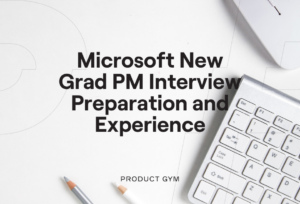Have you lined up an interview with your dream company only to develop major jitters before the first-round screening call? In the typical Product Manager interview process, there are 4 rounds: the first-round Product Manager interview with a recruiter, the second-round meeting with the Hiring Manager (usually a Product Manager at the company), the third-round onsite interview with company stakeholders, and finally the fourth and final interview where you’ll need to close an offer.
This blog post is for Product Managers in that recruiting and hiring cycle, either working with recruitment agencies or working with product management recruiters. Long story short, this is for anyone looking to hone the interview skills needed for Product Management.
How to Get Better at Interviewing
Nerves are an expected component of the interviewing process at every stage, but are especially common going into the first round — the phone screen round with a recruiter — as it’s the first contact you’ll have. The only way to calm your anxiety about the Product Manager first-round interview is to practice.
How do you go about doing this? Practicing mock interviews and getting up to speed with common interview questions are just a few key starting points. Interviewing is a muscle. Your first few calls will sound the worst because you haven’t been exercising this muscle. You’re not comfortable talking about yourself, and that’s fine. Yes, we repeat: that is fine! Only a handful of people are naturally good at interviewing, and it’s highly unlikely that you are one of them. What you need to do is to picture yourself doing it and practice sounding like a Product Manager.
Prepare Your Pitch
The first thing you should be doing going to your first round interview is to prepare a pitch, briefly introducing your professional background. There is a 99.9% chance that the first question you will receive from the interviewer will be, “Tell me about yourself.”
While talking about yourself with your resume on hand might look easy, you should know that many people fail this task without sufficient practice. You must prepare your pitch beforehand and work on it to make sure that it satisfies the expectations of the interviewer. Your pitch should be polished to showcase your background and work history in the best possible light.
6 Steps to Winning the First Round Product Manager Interview
Once you are done with crafting your pitch, follow these six steps to prepare for the first round interview. Bear in mind that the first round is almost always with the hiring manager or the recruiter. The interview’s focus is going to be your professional background. While you don’t want to use too much jargon, there are specific terms that you should be using. Using the right language shows the interviewer that you are well-suited for the task.
Here are six simple steps that will turn you into an expert interviewer!
1. Have Your First Few Words Ready
Rehearse the first few words that you’re going to say in the opening of the interview. Use it as a transition into what you want to communicate. Say it to yourself in front of a mirror and make sure you don’t stutter or stop.
2. Don’t Forget the Reasons for Leaving
Recruiters have picked your resume out of hundreds, perhaps thousands of submissions. Please don’t give them a red flag to discount you on the first call.
When you talk about the reasons for leaving, don’t forget to focus on areas which you had no control over. If you mention something personal, it will likely reflect poorly on you.
3. Mention Only Product-Relevant Experiences
Don’t just focus on what areas you are comfortable in. Translate that area into something more product-focused or simply talk more about the product experience related to your resume.
You may not have had a Product Manager title, but if you’ve “built consensus across multiple stakeholders in cross-functional teams,” then mention that and highlight it. you want to make sure you’re talking about your experience in a way that shows how transferrable it is — and believe us, your work history is probably more transferrable than you think.
4. Don’t Get too Industry Technical
You are already a working professional and you come from an already established industry. What tends to happen in first round calls is that you will usually default to what you’re comfortable with, so you end up talking a lot using industry jargon.
You have to understand that these recruiters are likely not from your industry. Sometimes they’re barely knowledgeable of the industry that they’re recruiting for. If you use too much time talking jargon, it confuses them.
5. Know What Questions to Ask
Culture. How has it changed? What do they think about the organization? Ask questions about the company as a whole. Your interviewer won’t be able to answer any questions that are product specific. If you ask too many product management questions that they don’t know the answer to, you risk making them feel stupid, and no one likes that.
Remember, you’re talking to a Recruiter or Hiring Manager! The product specific questions are something that, if you make it to the second round, your interviewer will be able to answer.
6. Ask Them What the Process Is
You have to ask what the processes for the next steps are. Is it going to be two, three, four calls? Who is it going to be with? Be as detailed as possible. You have to extract as much information in the beginning rounds if you expect to do well in the later rounds.
You can make significant progress in your interviewing by allocating a couple of hours to prepare yourself for these questions. While there is no guarantee that these steps will always lead you to the second round, asking about the process should always be a useful guide for you.
Win the First-Round Product Manager Interview
We cover interview skills and more — in detail — in our curriculum. Schedule a free career coaching session with our in-house team of coaches to learn more about how we can help you prepare for your product management job hunt. We’d love to answer any questions you may still have.
Also Read:



